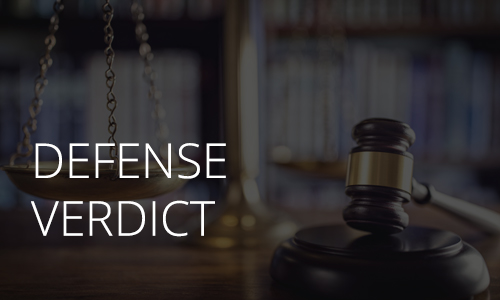Our claims team obtained a defense verdict on behalf of an internist and a cardiologist in a case involving a patient falling in a hospital fall allegedly causing a cervical spine injury, quadriplegia, and death.
The events of the case began when the 84-year old patient’s wife called the ambulance because the patient was complaining that he felt dizzy and short of breath. The ambulance transported the patient to the emergency department where he was found to have congestive heart failure, new onset atrial fibrillation, and light-headedness. On hospital day number 3, the patient’s daughter called to speak with her father. When he answered the phone, the daughter said she heard him cry out, and a second later, she heard what she thought was the phone striking the floor. The daughter called the front desk to report the incident. Two nurses went to the room and found the patient on the floor. He was conscious, but unable to get up. Other staff arrived, and the patient was assisted back into bed. While transferring the patient back to bed, the patient allegedly described a popping sensation in his neck. Shortly afterward, the patient was unable to move his extremities. An MRI confirmed extensive fractures of the cervical vertebrae. Neurosurgery attempted to stabilize the spine without success and the patient died approximately one month after the injury. The decedent’s wife brought suit against the hospital and the two physicians involved in the case.
Our claims defense team identified the following issues of concern regarding the defensibility of the case:
• Upon admission, the patient was placed on anti-hypertensive medications and was continued on Flomax, a medicine that is used for benign prostatic hypertrophy. Both medication classes can cause light-headedness and it was alleged by the plaintiff that negligently prescribing these medicines contributed to the fall.
• A thorough syncope workup was not performed.
• Fall precautions were not put in place.
After identifying the weaknesses, the team was able to build a sound defense strategy.
At trial, the plaintiff attorney attempted to make the case that the decedent suffered from orthostatic hypotension, a condition where light-headedness occurs due to a change in patient position, such as rising out of a chair. If this allegation were true, it would strengthen the plaintiff’s claim of negligence. To support their allegation, the plaintiff attorney planned to point to the ambulance report, as well as notes in the medical record written at the time of the fall, and an incident report that documented the fall, all of which described orthostatic hypotension.
Despite the appearance of evidence for orthostatic hypotension, the allegation of orthostatic hypotension did not withstand scrutiny. A thorough review of the chart and the patient’s history identified that although the patient had a long history of light-headedness, there was no history of orthostatic hypotension. The patient’s symptoms of light-headedness always occurred when the patient was laying down, a fact which was supported by the wife’s own testimony. Symptoms on this admission had not differed substantially from prior incidents and the patient had never experienced a single documented fall in relation to his symptoms. Importantly, the defense identified that portions of the chart which suggested orthostatic hypotension were in fact, hearsay and inadmissible. Although an exhaustive cause for the patient’s light-headedness was not pursued on the admission in question, the patient had been admitted to the hospital a few months prior, where a thorough workup had been performed. Additionally, the defense showed that the defendant cardiologist acted conscientiously in reaching out to contact the patient’s primary cardiologist to discuss the history and management of the patient. This fact helped to substantiate the cardiologist’s decision not to repeat prior workups but rather to focus on the issue of new onset atrial fibrillation as the primary focus of the hospitalization in question. Our defense’s expert physicians were able to defend the quality of care rendered by the cardiologist and internist involved in the case and to counteract expert testimony offered by the plaintiff’s experts.
After reviewing all the evidence, the jurors determined that our defendant physicians had not departed from the standard of care, and a verdict in favor of the defense was rendered.
**Although the disposition of this claim predates the formation of EmPRO, the management of the claim was handled by EmPRO’s management company (PRIMMA, LLC). To learn more about the EmPRO story, click here.
